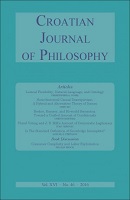Epistemic Priority or Aims of Research? A Critique of Lexical Priority of Truth in Regulatory Science
Epistemic Priority or Aims of Research? A Critique of Lexical Priority of Truth in Regulatory Science
Author(s): Joby VargheseSubject(s): Epistemology, Philosophy of Science
Published by: KruZak
Keywords: Science and values; epistemic values; lexical priority of truth; non-epistemic values; aims of science;
Summary/Abstract: A general criterion for distinguishing between epistemic and non-epistemic values is that the former promotes the attainment of truth whereas the latter does not. Daniel Steel (2010, 2016) is a proponent of this criterion, although it was initially proposed by McMullin (1983). There are at least two consequences of this criterion; (i) it always prioritizes epistemic values over non-epistemic values in scientific research, and (ii) it overlooks the diverse aims of science, especially the aims of regulatory or policy-oriented science. This criterion assumes the lexical priority of truth or lexical priority of evidence. This paper attempts to show a few inadequacies of this assumption. The paper also demonstrates why epistemic priority over non-epistemic values is a problematic stance and how constraining the role of non-epistemic values as ‘tiebreakers’ may undermine the diverse aims of science.
Journal: Croatian Journal of Philosophy
- Issue Year: XXII/2022
- Issue No: 64
- Page Range: 21-37
- Page Count: 17
- Language: English

